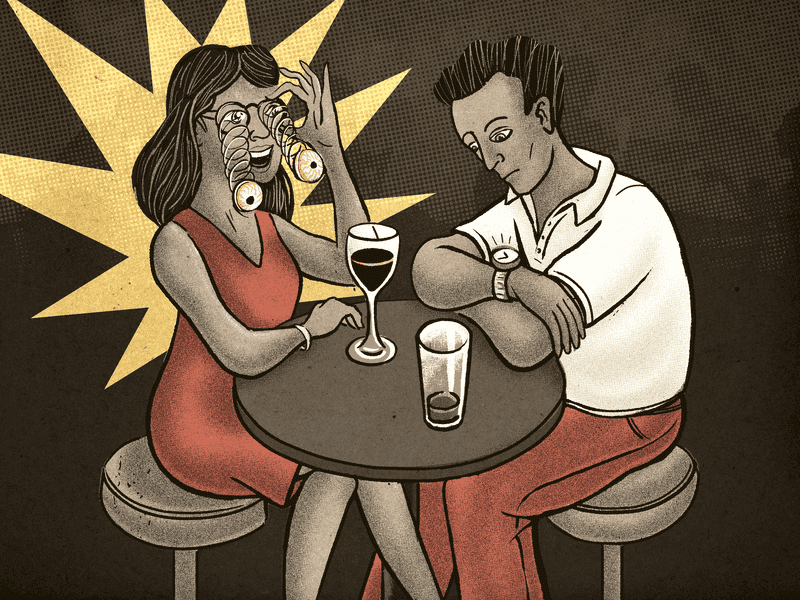It’s Not The Big Fights—These 18 Tiny Pet Peeves Are What Ends Most Relationships
In the intricate dance of relationships, it’s often the small things that cause the biggest stumbles. While major disagreements can be addressed head-on, it’s the accumulation of tiny irritations that erode the foundation of love.
These seemingly insignificant habits, when left unchecked, can unravel the fabric of a partnership. This post explores 18 everyday pet peeves that, though small in isolation, can drive a wedge between partners over time.
From the dismissive “fine” to the competitive storytelling, each behavior offers a glimpse into deeper emotional disconnects. Join us as we navigate these subtle relationship landmines and uncover the truths they reveal.
1. Answering “Fine” to Everything

“Fine.” Such a simple word, yet it carries the weight of a thousand unsaid things. When a partner answers every question or concern with this evasive term, it signals more than just indifference. It often masks underlying frustrations or an unwillingness to engage in meaningful conversation. Over time, this nonchalant dismissal can create a chasm of unresolved issues.
Each “fine” chips away at the intimacy, leaving partners feeling unheard and disconnected. The word may be intended to avoid conflict, but its repetitive use only breeds silence and resentment. It’s like putting a small patch on a growing crack, hoping it won’t widen.
2. Leaving Cabinets Open Like It’s a Game

Imagine walking into your kitchen and finding every cabinet door ajar. For some, this scene is an everyday reality, driven by a partner who seems to forget the final step in retrieving items. While it may seem trivial, this habit can symbolize a lack of consideration. It’s as if the person is saying, “I don’t care how you want things.”
Over time, such disregard can fester into larger conflicts. The open cabinets become a metaphor for open-ended issues in the relationship. What starts as a joke becomes a symbol of carelessness, leaving one partner feeling like they constantly need to close gaps.
3. Always Being Late—With No Real Apology

Time is a precious commodity, and consistently being late without genuine apology can speak volumes about priorities. When a partner repeatedly arrives after the appointed hour, it sends the message that their time holds more value. This habit can erode trust, as one partner begins to feel undervalued. Apologies that lack sincerity only add to the frustration.
The underlying issue is often about control or a lack of respect for the other’s schedule. Chronic lateness suggests an imbalance in the relationship, where one person’s needs overshadow the other’s. It’s not just about the time—it’s about the respect it reflects.
4. Constant Phone Scrolling During Conversations

In an age of digital distraction, constant phone scrolling during conversations is a common grievance. It’s not just about the device; it’s about presence. When a partner is more engaged with their screen than with the person across from them, it sends a clear message of disinterest. This habit creates a barrier, preventing genuine connection.
Over time, the phone becomes a symbol of emotional distance. Conversations lose depth, reduced to mere exchanges of words. The act of constant scrolling suggests that what’s on the screen is more important than what’s shared between partners. It’s a silent thief of intimacy.
5. Saying “Whatever You Want” But Never Meaning It

“Whatever you want” can sound accommodating, but repeated insincerity reveals underlying passive-aggression. When a partner consistently defers decisions with this phrase, it masks a lack of engagement. It can feel like a refusal to share the load of decision-making, leaving one person in perpetual limbo. This vague response often leads to dissatisfaction, as the true preferences of both parties remain unspoken.
The façade of agreement hides deeper issues of control or avoidance. Over time, this habit erodes trust, as one partner feels the weight of every choice. It’s not just the words—it’s the emotional detachment they signify.
6. Turning Every Story Into a Competition

Some conversations become battlefields, with one partner transforming every story into a competition. This habit isn’t just annoying; it reveals insecurity or a need for validation. When a partner feels compelled to one-up each anecdote, it detracts from the shared experience. The focus shifts from connection to competition, leaving one person feeling overshadowed.
Over time, this behavior erodes the foundation of mutual respect. Sharing becomes a chore instead of a pleasure, as stories turn into opportunities for rivalry. The need to constantly compete creates a disconnect, undermining the sense of partnership and camaraderie.
7. Avoiding Hard Topics Until It’s Too Late

Avoidance is a silent relationship killer. When partners sidestep difficult topics, it’s like putting a lid on a simmering pot. The issues don’t disappear; they intensify. Avoiding hard conversations suggests a fear of conflict or confrontation, but this strategy only postpones the inevitable. Over time, unspoken problems grow into insurmountable barriers.
The lack of communication breeds misunderstanding and resentment, as assumptions fill the void. Addressing tough subjects is essential for growth and understanding. By avoiding them, partners risk drifting apart, as the emotional distance widens. It’s about facing fears—not allowing them to dictate the relationship’s course.
8. Making Jokes That Don’t Feel Funny Anymore

Jokes are meant to lighten the mood, but when they become repetitive or insensitive, they lose their charm. When a partner continues to make jokes that no longer feel funny, it highlights a disconnect. Humor should be a shared joy, not a source of discomfort. These jokes can reveal underlying frustrations or passive-aggressive digs.
Over time, they become a symbol of misunderstanding, highlighting a lack of empathy or awareness. What once sparked laughter now sparks tension, as partners feel misunderstood. It’s a reminder that humor needs to evolve, ensuring it strengthens the bond rather than weakens it.
9. Forgetting Important Dates—Then Shrugging

Special dates hold emotional significance, serving as markers of shared experiences. Forgetting them, and then casually dismissing the oversight, can sting deeply. This habit reflects a lack of attention to the relationship’s emotional milestones. The shrug that follows only compounds the hurt, suggesting that these moments aren’t valued.
Over time, this neglect can foster feelings of neglect and insignificance. It’s not just about remembering; it’s about cherishing the shared journey. When important dates are forgotten, it conveys a message that the past and the memories created together hold little value, eroding the emotional connection.
10. Needing to Be Right Every Time

In any relationship, compromise is key. However, when one partner needs to be right all the time, it creates an imbalance. This behavior can stem from insecurity or a deep-seated need for control. Constantly insisting on being right can dismiss the other partner’s feelings and perspectives. Over time, this insistence erodes trust and mutual respect, making one partner feel undervalued and unheard.
Instead of fostering a collaborative environment, the relationship becomes a battleground for dominance. The need to always be right overshadows the importance of understanding and empathy, crucial elements for a healthy partnership.
11. Brushing Off What Matters to the Other

In relationships, acknowledging what matters to your partner is essential. When one partner consistently brushes off the other’s passions or concerns, it sends a message of indifference. This habit can make the affected partner feel undervalued, leading to frustration and resentment. Over time, the lack of support can weaken the bond, as shared enthusiasm dwindles.
What begins as a small oversight evolves into a significant issue, eroding the sense of companionship. Validating each other’s interests and emotions fosters intimacy and trust. By dismissing these, partners risk creating emotional distance and weakening the relationship’s core strength.
12. Being Supportive Only When It’s Convenient

True support means being there through thick and thin. When a partner only offers support when it’s convenient, it reveals a lack of commitment. This behavior suggests that support is conditional, based on personal convenience rather than genuine care. Over time, the inconsistency creates doubt and insecurity in the relationship.
The affected partner may feel like they can’t rely on their loved one when it truly matters. It’s not just about being present during the good times; it’s about standing by each other during challenges. Conditional support undermines trust, leaving a lasting impact on the relationship’s foundation.
13. Never Asking Questions Back

A good conversation is like a game of catch, balanced and reciprocal. When one partner never asks questions back, it reveals a lack of curiosity or interest. This habit can make the other partner feel ignored or insignificant, as if their experiences don’t matter. Over time, conversations become one-sided, lacking depth and mutual engagement.
The absence of reciprocity suggests a disconnect, where one person feels they’re talking to a wall rather than a partner. Engaging actively in each other’s stories fosters intimacy and understanding. Without it, partners risk drifting apart, as conversation becomes a monologue rather than a dialogue.
14. Acting One Way in Public, Another in Private

Consistency in behavior is crucial for trust. When a partner acts one way in public but differently in private, it creates confusion and distrust. This duality can stem from insecurity or a desire to maintain a facade. Over time, the affected partner may feel like they’re dealing with two different people.
The disparity between public and private behavior raises questions about authenticity and the true nature of the relationship. Trust is built on consistency, and when that is lacking, the foundation weakens. It’s about aligning actions with words, ensuring that the relationship is genuine both in private and public spaces.
15. Letting Chores Slide Until They’re a Fight

Chores may seem mundane, but they hold significant relational value. When one partner consistently lets chores slide, it signals a lack of shared responsibility. This habit often leads to conflict, as frustrations build over time. The accumulation of ignored tasks becomes more than just a messy home; it symbolizes imbalance and disregard.
The partner left to handle the chores may feel overwhelmed and unappreciated. Over time, this dynamic breeds resentment and strains the relationship. It’s not just about a clean house; it’s about showing respect and commitment to the shared life. Balance in responsibilities is key to harmony.
16. Rolling Eyes Instead of Talking It Out

Eye-rolling might seem trivial, but it speaks volumes in a relationship. This gesture conveys disdain or frustration, acting as a non-verbal dismissal. When one partner consistently rolls their eyes instead of addressing issues, it signals disrespect. Over time, this habit erodes trust and communication, as it dismisses the other’s feelings.
The eye-roll becomes a barrier to meaningful dialogue, preventing issues from being resolved. It’s not just a gesture; it’s a message that the other person’s concerns are laughable or unimportant. Effective communication requires openness and respect, essential for a thriving relationship.
17. Never Saying “Thank You” for the Little Things

Gratitude is the glue that strengthens relationships. When one partner never expresses appreciation for the small acts, it can lead to feelings of neglect. Thanking each other for everyday tasks fosters a sense of being valued and acknowledged. Over time, the absence of gratitude can create emotional distance, as one partner feels their efforts go unnoticed.
It’s about recognizing the little things that make life together smoother and more enjoyable. Expressing thanks is a simple yet powerful way to nurture intimacy and trust. Without it, partners risk taking each other for granted, weakening their bond.
18. Talking, But Never Really Listening

Communication is foundational, but it involves both talking and listening. When one partner talks without truly listening, it creates an unbalanced dynamic. This habit suggests a lack of genuine interest or empathy. Over time, the listener may feel unheard, as if their words don’t matter. True connection requires active listening, ensuring both voices are valued.
The failure to listen turns conversations into monologues, eroding the sense of partnership. It’s about engaging with the other’s thoughts and emotions, building a relationship based on mutual respect and understanding. Without listening, communication becomes hollow, fostering isolation rather than unity.







